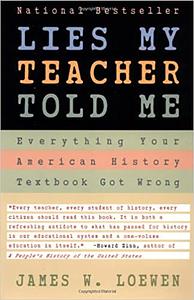Take a photo of a barcode or cover
1.03k reviews for:
Lies My Teacher Told Me: Everything Your American History Textbook Got Wrong
James W. Loewen
1.03k reviews for:
Lies My Teacher Told Me: Everything Your American History Textbook Got Wrong
James W. Loewen
challenging
informative
reflective
tense
medium-paced
challenging
informative
reflective
slow-paced
informative
inspiring
reflective
medium-paced
How accurate are American textbooks? This book highlights that they are not very accurate, which could be why many students don't see the importance of history. It's also the reason adults often fail to see how the past connects with the future. The author examines various historical facts and compares how they are presented, as well as what could be taught differently. One thing is clear from this book: history could be the foundation of teaching kids critical thinking.
What do you really know about history? This book made me confront what I actually learned in school. Today, our public school system appears to focus on preparing students for an end-of-year test rather than teaching them how to critically examine a subject. My main takeaway is that American history classes are often used to disseminate propaganda in this country. The watered-down history we receive leaves us bored and unable to envision a better future because we cannot critically examine the past. I believe if we taught kids how to think critically in history, it would also help them think critically in English classes. We cannot complain that kids can't or don't read and then provide no help to develop them into critical thinkers.
I would recommend this book to those who enjoy questioning mainstream narratives and are seeking a critical, thought-provoking exploration of American history. It offered a wealth of interesting facts, but it also provided me with insight into how I can continue to improve as a lifelong learner. Some of the questions will be helpful in my historical readings.
What do you really know about history? This book made me confront what I actually learned in school. Today, our public school system appears to focus on preparing students for an end-of-year test rather than teaching them how to critically examine a subject. My main takeaway is that American history classes are often used to disseminate propaganda in this country. The watered-down history we receive leaves us bored and unable to envision a better future because we cannot critically examine the past. I believe if we taught kids how to think critically in history, it would also help them think critically in English classes. We cannot complain that kids can't or don't read and then provide no help to develop them into critical thinkers.
I would recommend this book to those who enjoy questioning mainstream narratives and are seeking a critical, thought-provoking exploration of American history. It offered a wealth of interesting facts, but it also provided me with insight into how I can continue to improve as a lifelong learner. Some of the questions will be helpful in my historical readings.
funny
informative
reflective
slow-paced
challenging
informative
fast-paced
Although the premise of this book is awesome, the first two chapters are way too long and started losing my interest. Loewen goes into WAY too much detail and too much back story and lost a lot of gusto. I found myself skimming through the rest of the chapters. He's obviously a liberal person and I found his own politics overshadowing the facts.
As a history teachers wife, I know a thing or two about teaching. There is no way any teacher can teach anything completely unbiased. Whatever the teacher's passions are come out in his/her lesson plans.
As a history teachers wife, I know a thing or two about teaching. There is no way any teacher can teach anything completely unbiased. Whatever the teacher's passions are come out in his/her lesson plans.
informative
reflective
medium-paced
History as told by textbooks and the media is a propaganda machine that minimizes the role citizen activism has had in significant changes in U.S. policy, such as the Civil Rights Act and the creation of the EPA.
Loewen examines several high school history textbooks, exposing everything from factually incorrect narratives about Christopher Columbus and the founding of the U.S. to the dearth of information about the U.S. role in overthrowing democratic governments around the world. Post-secondary school, many of us have been exposed to these unsanctioned histories.
But it’s not just that textbooks get it wrong by not giving us all the facts.
The problem is that none of us are entirely impervious to the subtle brainwashing that takes place when the message of history whitewashes our government, turning it into an occasionally misguided but ultimately beneficent power. The distorted view we are fed of the past disempowers us. The truths that Loewen presents have layers of implications for how we think about democracy and our role in it.
Loewen examines several high school history textbooks, exposing everything from factually incorrect narratives about Christopher Columbus and the founding of the U.S. to the dearth of information about the U.S. role in overthrowing democratic governments around the world. Post-secondary school, many of us have been exposed to these unsanctioned histories.
But it’s not just that textbooks get it wrong by not giving us all the facts.
The problem is that none of us are entirely impervious to the subtle brainwashing that takes place when the message of history whitewashes our government, turning it into an occasionally misguided but ultimately beneficent power. The distorted view we are fed of the past disempowers us. The truths that Loewen presents have layers of implications for how we think about democracy and our role in it.
I initially held off from reading this, since I thought it'd be too similar to Zinn's Peoples' History of the United States, but I was wrong. This takes a different in approach in analyzing the most effective way to teach students about American history and why it should not be taught from the viewpoint that American has done nothing wrong. It goes into much greater detail on the impacts early American colonists have had on Native Americans, which was pretty neat to hear.
informative
medium-paced


